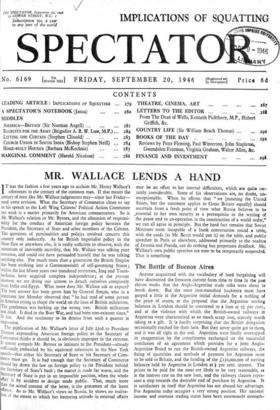MR. WALLACE LENDS A HAND
I T was the fashion a few years ago to acclaim Mr. Henry Wallace's references to the century of the common man. If that means the century of men like Mr. Wallace judgements may—since last Friday— need some revision. What the Secretary of Commerce chose to say in his speech to the Left Wing Citizens' Political Action Committee last week is a matter primarily for American commentators. So is Mr. Wallace's relation to Mr. Byrnes, and the allocation of responsi- bility for the conduct of American foreign policy between the President, the Secretary of State and other members of the Cabinet. The questions of persOnalities and politics involved concern this country only indirectly. As for British imperialist policy in the Near East or anywhere else, it is really sufficient to observe, with the minimum of inevitable incivility, that Mr. Wallace was talking pure nonsense, and could not have persuaded himself that he was talking anything else. For much more than a generation the British Empire has been evolving into a Commonwealth of self-governing States ; within the last fifteen years two mandated territories, Iraq and Trans- jordania, have acquired complete independence ; at the present moment we are doing our utmost to detach ourselves completely from India and Egypt. What more does Mr. Wallace ask or expect? The best answer has been given him by General Smuts, who in a statement last Monday observed that " he had read of some person in America trying to shape the world on the lines of British militarism. The gentleman was barking up the wrong tree. British militarism was dead. It died in the Boer War, and had been non-existent since." It has. And the testimony to its demise from such a quarter is impressive.
The publication of Mr. Wallace's letter of July 23rd to President Truman expounding American foreign policy as the Secretary of Commerce thinks it should be, is obviously improper in the extreme. It almost compels Mr. Byrnes to intimate to the President—already sufficiently embroiled by his equivocal references to the New York speech—that either his Secretary of State or his Secretary of Com- merce must go. It is bad enough that the Secretary of Commerce should lay down the law on foreign policy to the President behind the Secretary of State's back ; the matter is made far worse, and the Secretary of State is put in an impossible position, when the whole affair is by accident or design made public. That, much more than the actual content of the letter, is the gravamen of the latest Offence. As to Mr. Wallace's views on Russia, he shows no realisa- tion of the extent to which her hectoring attitude in external affairs may be an offset to her internal difficulties, which are quite oor- tainly considerable. Some of his observations are, no doubt, un- exceptionable. When he affirms that " we [meaning the United States, but the statement applies to Great Britain equally] should ascertain from a fresh point of view what Russia believes to be .essential to her own security as a prerequisite to the writing of the peace and to co-operation in the construction of a world order," we can all agree in principle. But the hard fact remains that Soviet Ministers seem incapable of a frank conversation round a table, with the cards (as Mr. Bevin would put it) on the table, and public speeches in Paris or elsewhere, addressed primarily to the readers of Isvestia and Pravda, can do nothing but perpetuate deadlock. Mr. Wallace's own public speeches are now to be temporarily suspended. That is something.


























